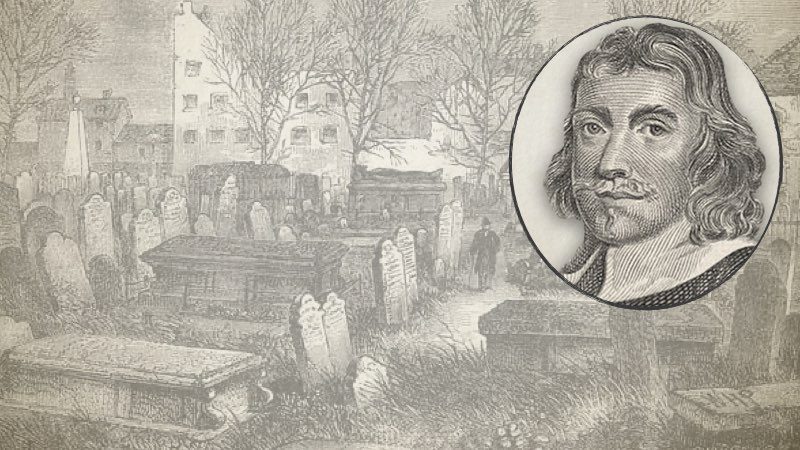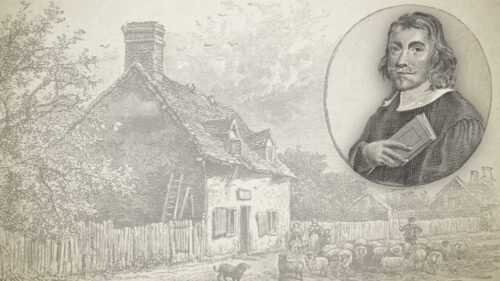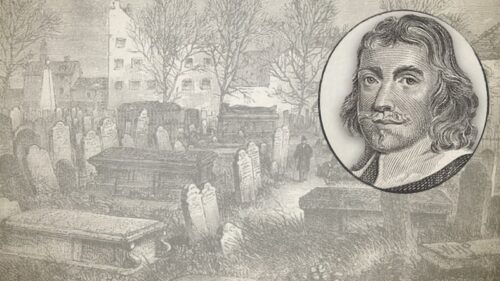
The Life And Death Of John Bunyan
J. A. Jones, “Bunhill Memorials: Sacred Reminiscences Of Three Hundred Ministers And Other Persons Of Note, Who Are Buried In Bunhill Fields, Of Every Denomination” (1849):[1]
Mr. John Bunyan, Author of the Pilgrim’s Progress, Ob. 31st August, 1688, aet. 60.
Tomb, E. and W. 25,26,—N. and 8. 26, 27.
The above is all that is inscribed (so far as he is concerned) on the tomb which is erected over the vault that contains the remains of Bunyan. At least the bodies of twelve other persons, if not more, are interred in the same vault, whose names are respectively inscribed on the tomb, and on each side. See note, p. 16. The name and fame of Bunyan stand in no need of sculptured monument to perpetuate his memory. His eventful Biography, his twelve years incarceration in Bedford Jail for preaching the gospel, All is well known. And, doubtless, God will bless to future generations, yea even to the end of time, his precious writings. He wrote sixty books, and lived sixty years.
Three thousand persons, it is said, have been collected in the Borough of Southwark, before breakfast, to hear him preach, even at one day’s notice. King Charles II. once asked Dr. Owen, how he, who had so much learning, could hear a tinker preach? To which the doctor replied, ‘May it please your Majesty, had I the tinker’s abilities for preaching, I would most gladly relinquish all my learning.’ In a word, whatever is Bunyan’s subject, man is humbled, Christ is exalted, and God is glorified.—I.
[The statute on which Bunyan was imprisoned, was enacted in Queen Elizabeth’s despotic reign, in which more sanguinary laws were made, than in those of her predecessors. It was entitled, “An Act for the punishment of persons obstinately refusing to come to church, &c.” It enacted, “that if any person above the age of sixteen, should refuse attending the reading of common prayer in some church, or should be present at any conventicle under pretence of religion, he should be committed to prison without bail: and in case he refused to sign a declaration of conformity within three months, he should abjure the realm, and go into perpetual banishment; in failure of which he was to suffer death, without benefit of clergy!!!” Under this dreadful Act, Bunyan was sentenced. Justice Keeling told him, “Hear your judgment; you must be had back again to prison, and there lie for three months following; and, at three months end, if you do not submit to go to church to hear divine service, and leave your preaching, you must be banished the realm; and, if after such a day as shall be adjointed you to be gone, you shall be found in this realm, or be found to come over again (without a special license from the king), you must stretch by the neck for it, I tell you plainly.” But, said the intrepid Bunyan, “I told him, as to this matter, I was at a point with him; for, if I were out of prison today I would preach the gospel again tomorrow, by the help of God.”]——————————-
[1] The reader is encouraged to visit Bunhill Fields, a nonconformist cemetery located at 38 City Road, London, England.
John Bunyan (1628-1688) was a sovereign grace preacher, author and poet. He was appointed the pastor of a non-conformist church in Bedford. Although he was a baptized believer, it is questionably whether the Bedford congregation was a Baptist church. He was an open-communionist, welcoming to the Lord’s Table all who professed faith in Christ. An open Table of this kind sidelines the ordinance of Baptism, thereby undermining a ‘Baptist’ identity. Nevertheless, Bunyan nurtured strong views on sovereign grace and is best known for his Christian allegory, “The Pilgrim’s Progress”.





